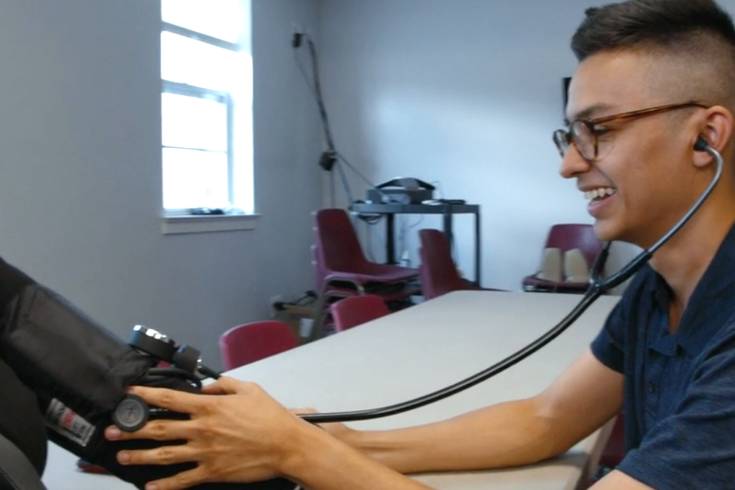
February 14, 2022
 Courtesy/Penn Medicine
Courtesy/Penn Medicine
Penn Medicine's new Leonard A. Lauder Community Care Nurse Practitioner Program will provide selected fellows a tuition-free, two-year training program that will give students hands-on patient care experience. The program was created with a $125 million donation, the largest gift ever made to a nursing program in the United States.
The University of Pennsylvania has received a $125 million gift to create a first-of-its-kind, tuition-free nurse practitioner program in Philadelphia that will recruit students to fill a growing shortage of primary care providers in the United States. The program will emphasize training a generation of care providers who will work in underserved communities.
The record-breaking gift comes from Leonard A. Lauder, a Penn alumnus and chairman emeritus of The Estée Lauder Companies. It is the largest donation ever made to an American nursing school.
"Now more than ever, the country needs greater and more equitable access to quality primary care—and highly-skilled nurse practitioners are the key to making that happen," Lauder said. "The program will ensure that more Americans receive the essential health care services that everyone deserves."
Nurse practitioners have advanced clinical skills and graduate training that equips them to supervise and manage care, often making key decisions in the treatment of patients. This includes diagnosis, ordering and interpreting tests, and prescribing medication for both acute care and chronic conditions.
The Leonard A. Lauder Community Care Nurse Practitioner Program will be a two-year commitment during which fellows will complete at least 50% of their clinical education at community partner sites that provide direct patient care. Every fellow will be expected to commit to practice in an underserved community for two years after graduation.
Penn Nursing will select the program's first 10 fellows to begin classes this fall, growing enrollment through 2026 when it will reach its annual target enrollment of 40 fellows. That number will continue in perpetuity.
All graduates of the program will be able to enter the workforce without associated student debt. Fellows who have greater financial need also will receive stipends to help them with living expenses.
"The synergy between Penn Nursing and the program will improve the health of underserved patients and families, by uniquely preparing primary care nurse practitioners, who will work with them in their communities," said Penn Nursing Dean Antonia Villarruel. "The sustained investment in the education and careers of primary care nurse practitioners and communities is unprecedented. We are excited by the opportunity to lead this important program and to extend its impact beyond Penn Nursing."
The gift comes as the U.S. braces for the long-term impact that a shortage of primary care providers and other essential health care professionals will have on a growing, aging population if proactive measures are not taken to encourage career paths in medicine.
An alarming report last November found that about one in five health care workers — roughly half a million people — have left the medical profession during the COVID-19 pandemic. Many have cited burnout and objections to how health care institutions, such as hospitals, have handled the crunch for care during the public health crisis and the burdens it has placed on their employees.
Though the situation is most dire among nurses, the Association of American Medical Colleges reported last year that the nation could see an estimated shortage of between 37,800 and 124,000 physicians by 2034, including shortfalls in primary and specialty care. Nurse practitioners play an invaluable support role in both of those types of practices.
"This is the most timely and consequential gift not only for our university but for our country," said former Penn President Amy Gutmann. "It is unprecedented in its potential to address America’s most critical need of providing primary health care to all who currently lack it by investing in nurses. Growing the number of nurse practitioners who are prepared and committed to working in underserved areas is the most practical and inspiring way to ensuring a healthier country."